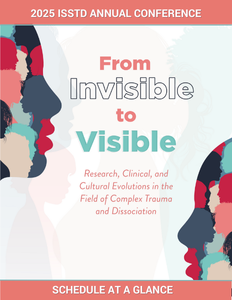Bringing Neurobiological Insights on Trauma and Dissociation into Therapeutic Practice
Abstract
A deeper neurobiological understanding of trauma and dissociation can significantly enhance therapeutic practice by reducing shame patients experience about these symptoms, improving assessment, and guiding novel interventions. However, translating neurobiological findings into clinical practice remains challenging, and the integration of this new knowledge is slow. This workshop aims to convey cutting-edge neurobiological findings on trauma and dissociation in a manner accessible to non-neuroscientists, and how clinicians can effectively incorporate these findings into their practice.
The workshop will cover a range of neurobiological topics, including:
Leveraging the neurobiology of dissociative identity disorder (DID) to optimize treatment success
Understanding the impact of moral injury on bodily self-consciousness in posttraumatic stress disorder (PTSD) and dissociation
Exploring the phenomenon of voice hearing in PTSD and DID
Examining the neurobiological consequences of racism-related stress
Capturing the daily lived experiences of trauma memories to understand how trauma is represented in the brain
Investigating the neurobiology of a vibroacoustically augmented breath-focused mindfulness intervention
Each presenter will cover the aforementioned neurobiological findings and how clinicians can integrate these specific insights into their practice. The workshop will end with a discussion of the next frontier in the neuroscientific study of trauma and dissociation, and a synthesis from an expert clinician on the potential for the presented work to enhance therapeutic practice.
Learning Objectives:
- Describe key neurobiological mechanisms underlying trauma and dissociation, including DID and PTSD
- Identify practical strategies for integrating neurobiological findings into clinical practice to improve treatment outcomes for patients with trauma-related disorders
- Explain the impact of moral injury on bodily self-consciousness in PTSD
- Discuss the neurobiological consequences of racial inequities and their implications for mental health
- Explain how intrusive trauma memories and voice hearing are represented in the brain


